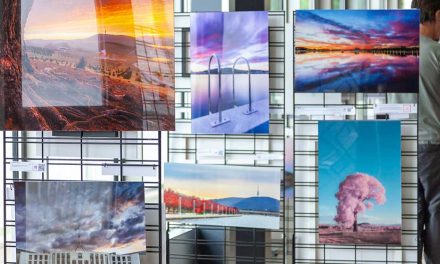The Rocket opens this week (29 August 2013). We sat down to chat with director by Kim Mourdant (Bomb Harvest, Copyrites) only to discover there were a couple of local links to this truly international film. Executive Producer Triphet Rookachat, an ex-monk in Canberra who ran restaurants and now spends most of his time in overseas, provided funding for the film. Producer Sylvia Wilczynski was born and bred in Canberra – her father worked at Duntroon.
We were keen to ask Kim about the difficulties of making films overseas, the changing market and what he thought of Skywhale.
A first time feature is a big step for any director. What were some of the lessons learned in your short films and documentaries that prepared you for taking on an endeavour like The Rocket?
The most important thing is managing the energy of the crew and cast, and determining what it is you’re trying to protect. On this occasion it was the energy of the child stars. I’ve got my own kid and with kids emotions can come but then go again very quickly. A set is a very artificial space, so if you can create a space where spontaneity occurs because when it does, that’s when the magic happens.
The challenges of shooting in South East Asia are well documented. You must have felt reasonably confident after making Bomb Harvest. Will your next project be a version of the documentary Heart of Darkness?
Who knows what it will be – but probably another fiction. Documentaries are fantastic to make, but you need to have the right subject matter.
Much of the film – for political reasons – was shot in Thailand. The sophistication of the crew is not what many Australians would expect. The Thai industry makes more movies than we do, and do a lot of the big blockbusters for the Americans such as Rambo. They were an incredibly professional outfit that helped us shoot to the conditions.
Your first film in Laos was very much centred around the humanitarian activities of bomb disposal. When heading back to Laos – this time to make a feature film – were there different barriers to production on behalf of the Laos Government?
The biggest issue we had with Bomb Harvest was that the Government didn’t really like the sub-narrative of kids involved in the scrap metal industry that directly results from bomb disposal. The flip side is that the documentary, which is still shown in visitor’s centres in Laos, has led to a lot of money being raised to assist with this work. As for The Rocket, as mentioned, the political issues surrounding the building of dams in Laos – which forms a trigger for many of the events in The Rocket – means it may not be shown in Laos for quite a while.
From what we’ve seen in the trailer, The Rocket is beautifully shot. Andrew Commis has done a great job. Given his experience with Mabo, The Slap and, importantly, Beautiful Kate what did Andrew bring to your idea of the visual style for The Rocket.
Andrew is a great Director of Photography and beautifully photographer of faces. We looked at his documentary stuff as well, in order to determine he could capture ta strong sense of place. He’s really good at shooting on the shoulder, which helps with the sense of intimacy. Laos has some incredibly dramatic landscapes – the dam included – but it really got him firing and as such the shots look absolutely extraordinary.
You tend to stay away from what might be termed ‘traditional stories’. Jammin’ in the Middle E and Copyrites centre on emerging and ancient cultures within Australia. Can you talk to us about what draws you to the stories you like to tell?
I’m not really into borders as such. We’re all just people with stories to tell. It’s these sorts of filmmakers that really interest me, and I love that directors can take a story in a global context and make it feel personal. My mother is from Mauritius, my father is from the UK and half my extended country are from everywhere else, so I’m perhaps more open to stories that aren’t so ‘white’.
The immigration and asylum seeker debate has certainly been a focal point of the 2013 Federal Election. As someone who clearly celebrates multicultural Australia, how do you react to the claim the immigration issue is one that resonates with Western Sydney?
People need to be able to look at someone else in the eye and think “What would I have done?” We’re a first world country with amazing resources so we should be helping as much as we can, but it’s difficult and it’s sensitive. I spend so much time floating back and forth from South East Asia, so even my sense of home is a bit skewed.
There’s been great critical reception to date of The Rocket, and the Sydney and Melbourne Film Festival audiences have loved it. What are your thoughts on the Australian movie audience? What are the biggest threats to making films the way you like to? Are blockbusters and digital delivery changing the landscape for filmmakers?
We’ll always have blockbusters. They fill the coffers of the studios, even though they cost a fortune. But when they lose, they lose big – just look at Zorro. As for digital delivery, that seems good to me, however I really don’t know what that will mean for ownership down the line, as the lines have become more blurry.
The good thing is that funding is becoming increasingly international. The beauty of that is that there’s more and more chance that the sort of films I like to make will continue to be made.
In recent years we’ve had a strong focus on Australia in what is called ‘The Asian Century’. Laos is still lagging in terms of development, but how can we cross the waters to better connect with Asia?
There’s an incredible ability to build links with our near neighbours through filmmaking. We are going to have to engage more and more with Indonesia. Why can’t reality TV involve a bunch of Sydneysiders living in Jakarta? That would be fascinating for both markets.
Perhaps that is your megabucks franchise – stories set in Western Sydney tailored to audiences of 100 million plus in Asia? Alice Keohavong certainly appears to appreciate a film about her culture.
(Laughs) Perhaps it’s a good plan! The interesting thing though is the way foreign films are treated by local audiences. It’s difficult to get people to read subtitles from countries other than France or Italy – perhaps because most people like to pretend they’re on holidays while they’re watching it. That kind of confuses me, as it’s no harder to read subtitles on a Laos movie – they’re still going to be in English – anyway, there appears to be some other barrier which I don’t necessarily understand.
It’s Canberra’s Centenary this year, and we love asking visitors what they think of Skywhale. What do you make of our most fertile balloon?
(Kim has a look on an iPad)
Oh my God. OH MY GOD. That’s amazing. Does that actually exist? Wow, a whale floating about Parliament House really ignites the imagination. It’s funny and bold, and if it got people talking that could only be a good thing. She’s amazing! I reckon there’s be a few bubs in prams who’d look up at that and feel a bit hungry.
Kim Mourdant – thanks for taking time to talk about The Rocket with OutInCanberra. All the best for the film.





